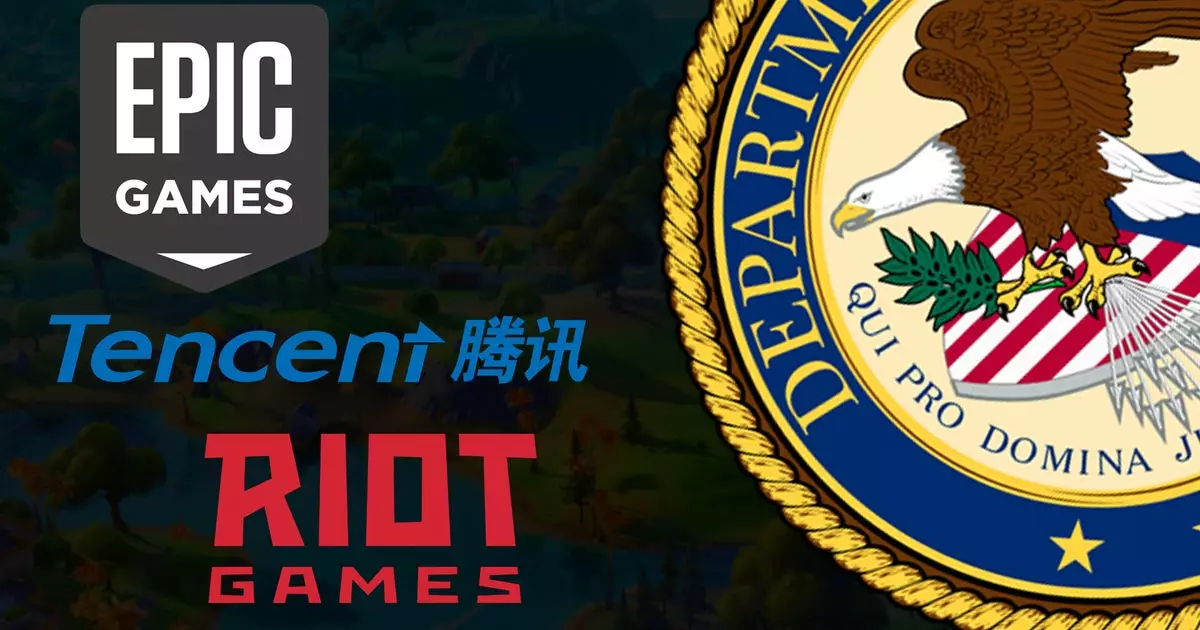In a significant move indicative of the tightening legal landscape surrounding corporate governance and antitrust regulations, two directors from the board of Epic Games have resigned following scrutiny by the United States Department of Justice (DoJ). This development unfolds amid a broader investigation into potential violations of antitrust laws, particularly concerning the complex interrelations between Epic Games, Riot Games, and Tencent.
The directors who have stepped down, Ben Feder and David Wallerstein, were appointed to Epic’s board by Tencent, a significant stakeholder in the company. Tencent not only holds a minority share in Epic Games, but it also owns Riot Games outright, which presents a potential conflict of interest. The DoJ’s findings have prompted a reevaluation of board-level appointments, questioning whether these roles can coexist without compromising competitive integrity. The agency’s interest revolved around the Clayton Act, a cornerstone of U.S. antitrust law that prohibits individuals from serving on multiple boards of competing companies.
Feder has a record as the President of International Partnerships at Tencent and has previously held the position of CEO at Take-Two Interactive, a major publisher under Tencent’s wing. On the other hand, Wallerstein was serving as Tencent’s Senior Executive Vice President until very recently, revealing a pattern of direct connections that may be misleading in terms of perceived independence in decision-making at Epic Games.
The situation illustrates a growing trend where corporate governance is closely monitored against the backdrop of antitrust considerations. With regulatory bodies ramping up scrutiny to prevent monopolistic behaviors, the Doe’s intervention signifies the continued efforts to uphold fair competition in a rapidly consolidating marketplace.
The comparison of the situation to allowing a board member from Pepsi to attend Coca-Cola meetings simplifies the complexity involved but highlights the essence of the issue—potentially compromising competitive advantages through overlapping governance. The resignations appear not only as an individual consequence but also as a broader message to companies about the need for clear separation and independence when it comes to boardroom functions, especially in industries where competition forms the lifeblood of innovation and consumer choice.
As part of the resulting agreements, Tencent has committed to amending its shareholder agreements with Epic Games, signifying an acknowledgment of oversight that must be addressed. They can no longer appoint directors to the Epic board in the future, which may indicate a necessary step toward decoupling twisted corporate allegiances that could hinder fair competition.
This adjustment will not only protect Epic Games from potential legal repercussions but also enhance its reputation among consumers and competitors alike. In a climate where company culture is closely scrutinized, healthy governance structures can define a company’s longevity, integrity, and public image.
Antitrust laws are designed to create a level playing field to avoid situations where a few dominant players can stifle competition. The gaming industry has often found itself at the heart of such scrutiny, evidenced by past cases against prominent companies like Valve and the recent investigations into Microsoft’s acquisition of Activision Blizzard. The ongoing attention from regulators is a manifestation of a much larger battle over who holds power in an industry that is not only financially massive but also influences cultural trends across the globe.
As the digital sphere continues to evolve, and as gaming increasingly becomes intertwined with social media and online interaction, the importance of fair play in business practices cannot be overstated. Companies like Epic Games and Tencent are at the forefront of this evolving narrative, and how they navigate these waters could shape not only their futures but also the industry’s trajectory.
Ultimately, the resignations at Epic Games shine a light on the critical nature of corporate governance in a world where conflicts of interest can lead to significant legal scrutiny and reputational damage. As these companies adjust to the demands of fair competition, they must recognize that transparency and ethical governance are not mere regulatory requirements—they are essential for fostering trust and innovation in the ever-evolving landscape of the gaming industry. By embracing these standards, Epic Games sets an example that could reverberate through the halls of corporate America, promoting a business environment where competition can thrive without the specter of monopolistic dominance.

